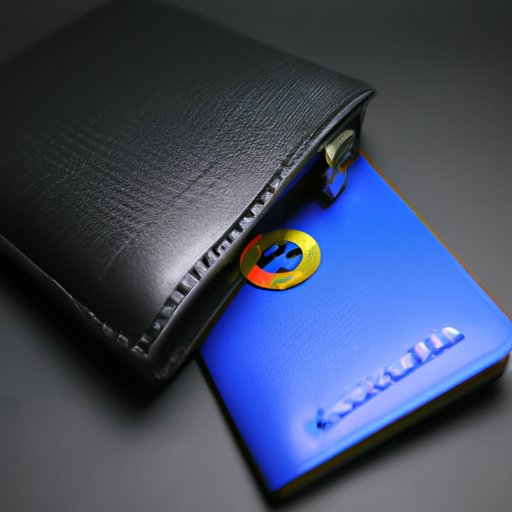Introduction
Cryptocurrency wallets are an essential tool for anyone interested in buying, selling, or trading cryptocurrency. They provide digital storage for private keys and public addresses, enabling users to securely manage their digital assets. But with so many different types of wallets available, it can be difficult to know which one is the safest option. In this article, we’ll explore the safety features of crypto wallets and discuss the various threats to wallet security.
Pros and Cons of Crypto Wallets
Crypto wallets offer several advantages over traditional banking solutions. For one, they allow users to remain anonymous while transacting online, as no personal information is needed to set up a wallet. Additionally, transactions are typically much faster than those processed by banks. Finally, crypto wallets are generally more secure than other forms of payment, as they store all data on a decentralized network.
However, there are some drawbacks to using crypto wallets. For example, if you lose your private key, you may not be able to recover your funds. Additionally, crypto wallets are vulnerable to cyberattacks, as hackers can attempt to steal funds from wallets that are not secured properly. Finally, some countries have regulations against cryptocurrency, making it difficult to use crypto wallets in certain locations.

Security Measures of Popular Crypto Wallets
Crypto wallets come with a variety of security measures designed to keep your funds safe. The most basic security measure is two-factor authentication (2FA), which requires users to enter a code sent to their mobile device or email address when logging into their wallet. Other security measures include multi-signature authorization, which requires multiple people to sign off on a transaction before it is completed, and encrypted backups, which allow users to back up their wallet data in case of emergency.
When choosing a crypto wallet, it’s important to examine the security features offered by each one. Some wallets offer additional features such as cold storage, which keeps funds offline in a secure environment, and hardware wallets, which are physical devices designed to store crypto assets.

Threats to Crypto Wallet Security
Even with all the security measures in place, crypto wallets can still be vulnerable to cyberattacks. Common threats include phishing scams, malware attacks, and social engineering. Phishing scams involve sending fake messages in an attempt to trick users into revealing sensitive information, while malware attacks involve malicious software that can steal passwords and private keys. Social engineering involves manipulating people into revealing confidential information.
To protect yourself from these threats, it’s important to take extra precautions. Make sure to use strong passwords and enable two-factor authentication wherever possible. Additionally, never share your private key or any other sensitive information with anyone. If you suspect that your wallet has been compromised, contact your wallet provider immediately.
Different Types of Crypto Wallets
There are several different types of crypto wallets available, each with its own set of features and security measures. Hot wallets are connected to the internet and are ideal for day-to-day transactions, while cold wallets are not connected to the internet and are better suited for long-term storage. Mobile wallets are convenient for making payments on the go, while desktop wallets are more secure but require a computer to access. Finally, paper wallets are physical documents used to store cryptocurrency offline.

Comparing Crypto Wallets in Terms of Security
When comparing crypto wallets in terms of security, it’s important to consider the type of wallet being used as well as the security measures it employs. Hot wallets are generally less secure than cold wallets, as they are connected to the internet and therefore more vulnerable to attack. However, some hot wallets offer additional features such as multi-signature authorization that can help improve security. Desktop wallets are typically more secure than mobile wallets, as they are not exposed to the same risks associated with connecting to the internet.
Paper wallets are also relatively secure, as they are not connected to the internet and can only be accessed by the user who holds the physical document. However, paper wallets are vulnerable to physical theft and damage, so it’s important to store them in a secure location.
Decoding the Encryption Behind Crypto Wallets
The security of crypto wallets relies heavily on encryption. Cryptographic protocols are used to scramble and unscramble data, while advanced encryption standards (AES) are used to protect data at rest. Additionally, many wallets employ elliptic curve cryptography (ECC) to generate unique, secure private keys.
By understanding the encryption behind crypto wallets, users can gain a better understanding of the security measures employed by different wallet providers. This knowledge can help users make informed decisions about which wallet is best for their needs.
Conclusion
Crypto wallets can be a great way to store and transact digital assets, but it’s important to understand the security features of each wallet and the threats to wallet security. Hot wallets are more convenient but less secure than cold wallets, while paper wallets offer an extra layer of protection but are vulnerable to physical theft. By understanding the encryption behind crypto wallets, users can make informed decisions about which wallet is best for their needs.
With the right security measures in place, crypto wallets can be a safe and secure way to store and transact digital assets. By taking the time to research the different types of wallets available and implementing the necessary security measures, users can ensure their funds are safe and secure.
(Note: Is this article not meeting your expectations? Do you have knowledge or insights to share? Unlock new opportunities and expand your reach by joining our authors team. Click Registration to join us and share your expertise with our readers.)
